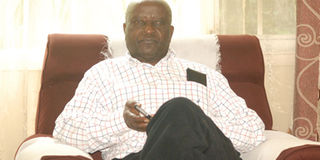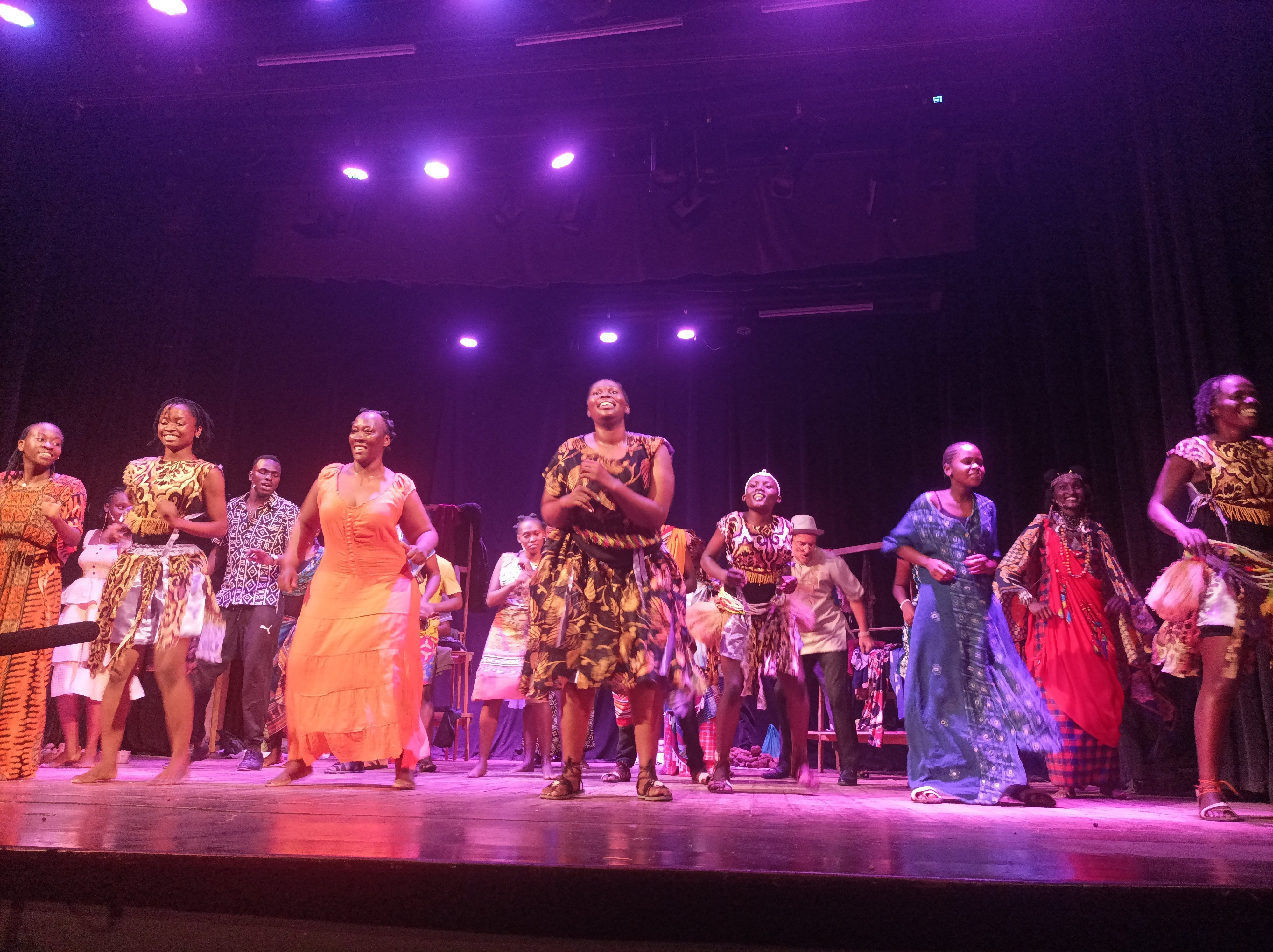Bidandi Ssali: I am done with politics

What you need to know:
Throughout the interview, Bidandi Ssali told Edgar R. Batte that his time with politics is pretty much over and he wants to concentrate on other things. He speaks more about his wife Susan, his family and his philosophies about life.
On a rainy Sunday morning is when Jaberi Bidandi’s Ssali finally agrees to meet me at his home in Bukoto. When I arrive, his gate is open and his home quiet and discernibly humble, surprising for a man who owns chunks of lands in the most prime parts of this suburb and beyond.
His lawns are well-tended, dotted with trees, and the part which is tarmacked is spotlessly clean. A middle-aged man having a conversation with a friend as they have breakfast springs to his feet when he sees me.
“You are welcome,” he says in Luganda as he reaches out to shake my hand. He is a guard at the home.
I am led into the main house where I am greeted with modest surroundings – a neat mahogany dining table and chairs, maroon cushions and simple breakfast tables.
In the sitting room walls are photographs of Bidandi, his portraits, one with his friends, Kintu Musoke and Kirunda Kivejinja, and another of taking Kabaka Ronald Muwenda Mutebi II around his farm.
It is a few minutes to 8am and Bidandi, or Mzee, as the guard calls him, is still sleeping. As I wait for him, another visitor comes in. The silence that ensues thereon between the two strangers is made bearable by the soft gospel music playing on radio. It is finally broken by a soft voice from the dining room that lets us know Bidandi will be with us shortly.
Minutes later, another middle-aged man emerges and comes in to also greet the visitors. Finally, Bidandi emerges, takes one of the seats, greets us and immediately starts a conversation with the other visitor, explaining to him that he cannot be of much help.
“My doctors advised me to quit politics so any matter to do with PPP (People’s Progressive Party) is handled by the offices which I fully relinquished to the office bearer. I am now fully enjoying my rest and holiday from politics,” he announces in a matter-of-fact tone.
Meeting the man
Breakfast is served and we enjoy it together. Immediately the other visitor is done, he begs to leave. “You are a very persistent fellow,” he says, smiling at me, when we start a conversation. “I am not going to tell you a thing,” he adds, to which I smile, glad that after 11 months, the chase is over.
“I am retired and not in the news anymore. What is there about me that you want to know, an old man?” sipping on his cup of millet porridge.
He stares at me hoping for an answer, then picks his fork and digs it into a fried Irish potato and eats it, slowly chewing on it before he swallows. “You see, I want to live a quiet life for the rest of the days the Lord has given me on earth, so my friend there is no story for you,” he says.
“I will tell you a story, but it just for your knowledge,” he says. He then tells me about a boy born in Butambala who ended up in Naguru and then Kibuli where he lived with people from different backgrounds but managed to fuse in so well.
“I have a feeling that my political outlook and relation reflected the social environment which brought me up. If it was Swahili I tried to speak it, and the same for Acholi or any other language. This impacted on me and my political career reflected the tolerance and the acceptances of whoever I was around,” he explains.
“Soon people saw a trait of leadership in me,” he says. “So I would say I became a leader out of character than anything else,” Bidandi states.
His wife then comes in. “Daddy you have not eaten your egg,” she says as she checks the plate. “Darling, I am going to, don’t worry,” he responds patting her on the hand.
“You see, this young man is disturbing me,” he reports, with a smile. “Why are you disturbing my boyfriend,” she cheekily asks?
When she leaves, he tells me about their friendship that is past 40 years old. “She is my good friend,” he says. “I have had children with other women, you know, as a youth…but there is no single night I have not slept in this house with my wife,” he explains.
A humble simple person
He goes on and on and after two hours of light conversation he says, “Hope you were clever enough to record. That’s good enough.” I talk about the respect I have for him and why I would not employ underhand methods to get a story from a man of his stature.
“Okay, I will give you an interview some other day, may be tomorrow,” he says, making me smile. The next morning, at 8am I walk into his gates like I am no longer a visitor anymore. Ms Bidandi welcomes me like a mother happy to see their son. I later on learn from her tales that she picked this from her mother and carried it on, raising other children like they were her own.
When I settle down to finally interview Bidandi Ssali, I ask him to describe who he is. The retired politician says, “I don’t know my character. People say I am a kind, social, simple, humble person and others say the opposite.”
I find this a sign of humility and diligence, one of the few politicians whose career, which spans more than 50 years, is not stained by corruption or scandals. The former presidential aspirant who was born on July 17, 1937 says his work has always been about doing his duty for the people.
“To me it was all about serving the people and having the public’s interest at heart,” he says before sharing a story, among many, of individuals who tried to bribe him. “In the 1970s, we had a scarcity of soap and as trade minister, I had to look for ways of solving the problem, so I managed to find a trader who could actually manufacture the soap. He was so delighted that he sent someone with a box of money. I was shocked,” he recounts.
He kept the box, invited the trader, the person he had sent to take him the money, the prime minister at the time and the headmaster of Bukoto Muslim Primary School.
“I narrated to the prime minister what had happed and asked the trader to pass on the box of money to the headmaster so that they could build a new block for the school. The trader did so but he was shocked,” he narrates, with simplicity.
Like that, he has been able to serve in different governments, right from the pre-independence era when he started his active political career.
But Bidandi’s political journey began while he was in high school, at Nyakasura School. “I was a leader and held leadership roles like being a librarian and house head boy,” he recounts.
He says it was at university in Pakistan that he actually developed the interest in politics, which was the time when the African continent was boiling. He happened to be a general secretary then later on president of African students in Pakistan.
“When we combined an association of Africans with that of Indians, I became a vice president of the indopark. That interaction began following the politics of the African continent, and of course, that of Uganda. We held a conference about the independence of Uganda in London,” he explains.
Joining politics in Uganda
This triggered the struggle of the African National Congress (ANC). This was the late 1950s and trickled down into the early 1960s. “I came back to Uganda in early 1962. When I and Kintu Musoke and Kirunda decided to join politics locally, we joined Uganda People’s Congress (UPC). I soon become assistant organising secretary for Buganda,” he narrates.
He adds, “During that time UPC represented the values and attributes which I developed by being a president of all African students in Pakistan. UPC at that time was a national political party.”
It offered hope to Ugandans who wanted to uproot colonialism. Milton Obote was the party leader and Bidandi says he reflected a lot of nationalism before independence and for the first few months after independence.
“…Then after he changed colours when he became prime minister of the country and he was accepted by most parts of Uganda except Buganda. After a year of independence, he started feeling the power, many of the forces that helped him became dispensable to him. That is why he arrested some officials in UPC and government,” the veteran politician recalls. He points out that Obote’s mistake was shifting his source of power to the army.
“The more he recruited his people in the army, the more he promoted more people from his area. That way, he felt safer and neglected the party (UPC),” Bidandi adds.
Shelving politics
Politics was Bidandi’s life until Idi Amin came to power. The youth winger cleverly took a political sabbatical and turned his passion to the game of football.
“When Amin took over, there was no politics anymore. There was little business but we had a football club in Naguru and KCC football club played in Lugogo. I joined them for training just to continue with my sports. I became coach and that’s how I survived Amin,” he smiles.
And for a month or two, he was team manager of Uganda Cranes. “For some reason, the late David Otti could not manage the team for some time. Later on Peter Oke took over from me,” he recounts.
At that time, the team comprised great players like Phillip Omondi and Moses Nsereko, among others. As a player, Bidandi wore the shirt number nine.
A while later, Amin was overthrown by Tanzanian troops and forces of the Uganda National Liberation Front (UNLF). That was the first time Bidandi recalls meeting Yoweri Kaguta Museveni.
Bidandi returned to the political scene as minister under Godfrey Binaisa and thereon under Tito Okello Lutwa where he served as minister of sports. But he says all these appointments caught him unaware.
“I was appointed. I do not remember campaigning. During the military commission I was home listening to radio and I heard I was being appointed minister. Another time I was at my workshop and my workers told me I was appointed minister of regional administration under Binaisa,” he proudly recounts. Bidandi, like his wife attests, is a person who is simple and carries the values of democracy home.
“I have let all my children be what they want to become. I was only strict on them going to school. I have never used my name and neither have they used the fact that I am their father to get a favour. One of my children is a banker but their supervisor only realised I was the father when they asked for the parental names,” he explains.
Perhaps this has to do with the humble background. “I was born in a simple peasant family. My father, the late Umar Kakonge, was a potter in the sub county. Every morning, he was in the gardens and in the afternoon he would make pots. My mother, Rose Bulyaba, was a housewife,” he shares.
He says he was a brilliant boy and obedient boy and a result became his parents’ darling.
Throughout the interview, he stresses he does not want to discuss politics but when I ask him for his parting comment it is a message to leaders.
“To leaders at every level, I want to say that leadership is serving, it is dedication, it is a tradition. If one has a choice, let them get into business and get money, but you cannot use politics to make money and you can’t use money to buy politics.”




